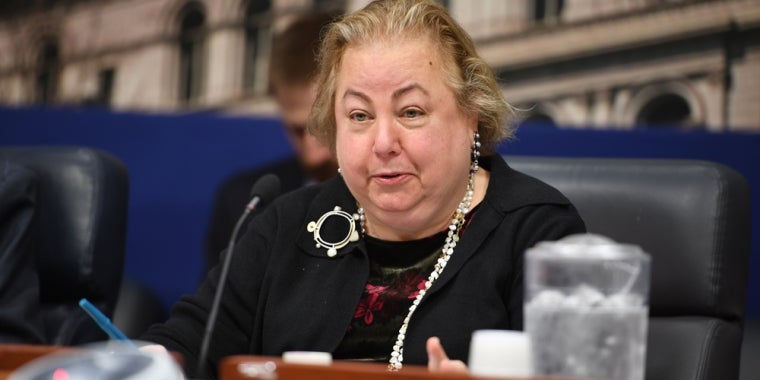
State Senate Finance Chair Debunks Pro-Fossil Fuel Report On Divestment
May 2, 2019

Albany – Today, on the heels of a comprehensive hearing on fossil fuel divestment, State Senator Liz Krueger, Chair of the Senate Finance Committee, debunked a pro-fossil fuel report commissioned by the Suffolk Association of Municipal Employees, prepared by Florida-based firm Foster & Foster.
"At Tuesday's hearing, one message was hammered home by expert after expert, whether they support our legislation or not: fossil fuels are a bad long-term investment, and they will only get worse," said Senator Krueger. "This report from Foster & Foster uses the best tools in the climate denial playbook, cherry picking a few of the worst-performing green assets to set up a straw man that has nothing to do with divestment in the real world. If the Suffolk AME leadership was looking for an honest assessment of the impact of divestment on the pension fund, I'm afraid they wasted their members' money."
The report, titled "The Cost of Divestment," compares a list of five fossil fuel-based mutual funds with five carefully selected green energy funds. Looking only at the 10-year average returns of both sets of funds, the report finds that these specific fossil fuel-inclusive funds outperformed over that period (though not over the 2, 3, or 5-year period). The report then uses the average returns of these funds over the past ten years to project 10, 20, and 30 years into the future.
The report makes several erroneous basic assumptions that lead to its flawed conclusions. First, it assumes that all monies divested by the pension fund from fossil fuel holdings will be required to be reinvested solely in green energy stocks. This is neither mandated by the bill under consideration (S.2126), nor advocated by those supporting divestment.
This error is compounded by the reliance on a comparison of five cherry picked fossil fuel energy funds with five green energy funds. Even when comparing these carefully chosen funds, the report's authors were forced to ignore the fact that the green energy funds outperformed the fossil fuel funds over the last 2, 3, and 5 years, reflecting significant changes in the market as the world begins to adjust to the need for a carbon-free future.
A more accurate historical analysis was performed in 2018 by Corporate Knights, which compared the actual holdings of the fund over the last decade with a scenario in which the fund had divested from fossil fuel companies and reinvested those funds evenly across the remaining portfolio. They found that the fund would be $22.2 billion better off had it divested in 2008, working out to almost $20,000 more for each member and retiree in the system. This state of affairs is likely to be compounded as governments, businesses, and individuals take increasing action to prevent catastrophic climate change.
The report also makes a basic error in directly using past performance as a sole predictor of future returns, something any financial advisor would warn against. Although fossil fuels were profitable investments throughout much of the 20th century, they have underperformed benchmark indices like the S&P 500 over the past decade. The most basic comparison of U.S. fossil fuel stocks to general stocks shows that fossil fuel stocks underperformed by more than 10% on an annualized basis over the past ten years: as of May 1, 2019, the fossil-fuel free S&P 500 Ex-Energy TR Index reported a 16.09% ten year annualized return compared to 5.35% for fossil fuel-inclusive the S&P 500 Energy (Sector) (TR) Index. All indicators suggest this underperformance will continue as technology makes low-carbon solutions the cheaper energy option and the world acts on climate change.
Long-term trends toward a low-carbon economy do not suggest a repeat of any sustained fossil fuel boom similar to previous periods. In fact, a recent report by Mercer, referenced by the Office of the State Comptroller in Tuesday's hearing, forecast that under a 2°C warming scenario in line with the Paris Agreement, the value of fossil fuel stocks will plummet within the next decade. Not incidentally, the report also found that in a scenario with greater than 2°C of warming, the value of all stocks would fall precipitously.
In 2017, Suffolk AME leaders commissioned a similarly flawed report from Global Analytic Services, primarily based on the writings of Daniel Fischel and Hendrik Bessembinder of Compass Lexecon. Their work was funded by the Independent Petroleum Association of America, and has also been debunked.
"The facts are crystal clear: divesting our state pension fund from fossil fuels will protect workers and retirees from the rapid loss of value that fossil fuel companies will suffer in the coming energy transition," said Senator Krueger. "New York State should be a leader on this issue, to ensure that our retirees and their children and grandchildren will not only have a pension to enjoy, but also a livable planet on which to enjoy it."
###
BACKGROUND:
- Report: fossil fuel divestment could crimp state pension assets, Newsday
The Fossil Fuel Divestment Act (S.2126/A.1536) would require the State Comptroller to divest the New York State Common Retirement Fund from all holdings in the 200 largest publicly traded fossil fuel companies, as defined by carbon content in the companies’ proven oil, gas, and coal reserves (the CU 200). Divestment from coal companies would be completed within one year; divestment from all other fossil fuel companies would be completed within five years. Currently, ExxonMobil represents the largest single CU200 holding in the CRF, with around $1 billion invested.
Worldwide there are currently 1,055 institutions that have committed to divest, including universities, faith-based organizations, non-profits, municipalities, philanthropic organizations, and national and state pension funds, controlling $8.73 trillion in assets. In 2018, Ireland became the world's first nation to fully divest its $10.4 billion sovereign wealth fund from fossil fuels.
The list of institutions involved in the divestment movement includes the Teachers Retirement System of the City of New York, New York City Employees Retirement System, California Public Employees' Retirement System (CalPERS), California State Teacher's Retirement System; Pratt Institute, Union Theological Seminary of New York City, The New School, and Stanford and Syracuse Universities; the cities of Seattle, San Francisco, Portland, Minneapolis, and Ithaca; the World Council of Churches, and the United Methodist Church USA; Guardian Media Group, the Rockefeller Brothers and Family Funds, The Blumenthal Foundation, and the sovereign wealth fund of Norway. A full list of divestment commitments can be viewed here.
Supporters of divestment argue not only that it is no longer acceptable to financially support the extraction of climate-destabilizing fossil fuels, but also that the state pension fund is exposed to increasing financial risk by holding onto fossil fuel companies, which stand to lose significant value as the world acts to mitigate climate change. The impact of the clean-energy transition is already being felt by these companies, and the economics of renewable energy continues to develop in such a way as to threaten the hegemony of fossil fuels regardless of the actions taken by governments. The Common Retirement Fund has already lost more than $260 million in coal investments since 2010; a recent study by Corporate Knights estimated that the Fund is valued at $22.2 billion less than it would have been had it divested from fossil fuels in 2008 and redistributed those funds across the rest of the portfolio.
The global divestment movement is having an impact on fossil fuel producers, in part through the process of stigmatization, which can damage enterprise value by discouraging engagement by business partners, employees, lenders, governments, politicians, etc, as well as leading to restrictive legislation. The increased scrutiny tar sands have received as a result of divestment and allied stigmatization campaigns was a contributing factor to Exxon’s decision to write down the value of its tar sands reserves. Peabody Energy, a coal producer that went bankrupt in 2016, said of the divestment movement: “the impact of such efforts may adversely affect the demand for and price of securities issued by us, and impact our access to the capital and financial markets.” Shell now cites divestment as a major material risk to its current business model, which could lead to project delays or cancellations and could affect its ability to access capital. The Common Retirement Fund has invested $2.7 million in Peabody Energy, $133 million in Shell, and over $1 billion in Exxon.
related legislation
Share this Article or Press Release
Newsroom
Go to Newsroom


